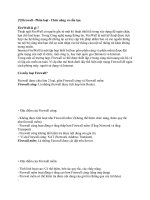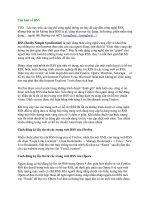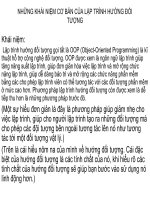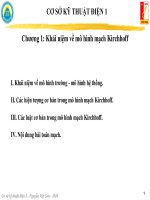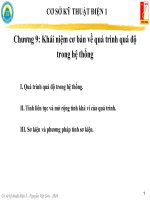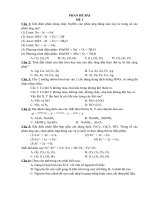Tuyển tập đề thi trắc nghiệm lập trình C HAY
Bạn đang xem bản rút gọn của tài liệu. Xem và tải ngay bản đầy đủ của tài liệu tại đây (235.08 KB, 42 trang )
Trắc nghiệm lập trình C
vncoding.net Page 1
Title : Trắc nghiệm lập trình C
Author : Vu Hong Viet
Date : 07/09/2014
Các câu hỏi trắc nghiệm được thành viên diễn đàn vncoding sưu tập và biên soạn dựa trên quá
trình học tập và kinh nghiệm thực tế. Chúng tôi đã chủ định biên soạn các câu hỏi trắc nghiệm
bằng tiếng anh, vì đa số các đề thi trắc nghiệm lập trình vào các công ty phần mềm bằng tiếng
anh.
Đáp án được giải thích chi tiết tại diễn đàn:
1. Khái niệm cơ bản ngôn ngữ lập trình C
1. What is the correct value to return to the operating system upon the successful
completion of a program?
A. 0
B. -1
C. 1
D. Do not return a value
2. What is the only function all C programs must contain?
A. start()
B. system()
C. main()
D. program()
3. What punctuation is used to signal the beginning and end of code blocks?
A. { }
B. -> and <-
C. BEGIN and END
D. ( and )
4. What punctuation ends most lines of C code?
A. .
B. ;
C. :
D. '
5. Which of the following is a correct comment?
A. */ Comments */
B. ** Comment **
C. /* Comment */
Trắc nghiệm lập trình C
vncoding.net Page 2
D. { Comment }
6. Which of the following is not a correct variable type?
A. float
B. real
C. int
D. double
7. Which of the following is the correct operator to compare two variables?
A. :=
B. =
C. equal
D. ==
8. Which of the following is true?
A. 1
B. 66
C. .1
D. -1
E. All of the above
9. Which of the following is the boolean operator for logical-and?
A. &
B. &&
C. |
D. |&
10. Evaluate !(1 && !(0 || 1))
A. True
B. False
C. Unevaluatable
11. Which of the following shows the correct syntax for an if statement?
A. if expression
B. if { expression
C. if ( expression )
D. expression if
12. What is the final value of x when the code int x; for(x=0; x<10; x++) {} is run?
A. 10
B. 9
C. 0
D. 1
13. When does the code block following while(x<100) execute?
Trắc nghiệm lập trình C
vncoding.net Page 3
A. When x is less than one hundred
B. When x is greater than one hundred
C. When x is equal to one hundred
D. While it wishes
14. Which is not a loop structure?
A. for
B. do while
C. while
D. repeat until
15. How many times is a do while loop guaranteed to loop?
A. 0
B. Infinitely
C. 1
D. Variable
16. Which is not a proper prototype?
A. int funct(char x, char y);
B. double funct(char x)
C. void funct();
D. char x();
17. What is the return type of the function with prototype: "int func(char x, float v, double
t);"
A. char
B. int
C. float
D. double
18. Which of the following is a valid function call (assuming the function exists)?
A. funct;
B. funct x, y;
C. funct();
D. int funct();
19. Which of the following is a complete function?
A. int funct();
B. int funct(int x) {return x=x+1;}
C. void funct(int) {printf( "Hello" );
D. void funct(x) {printf( "Hello" ); }
20. Which follows the case statement?
A. :
B. ;
C. -
Trắc nghiệm lập trình C
vncoding.net Page 4
D. A newline
21. What is required to avoid falling through from one case to the next?
A. end;
B. break;
C. Stop;
D. A semicolon.
22. What keyword covers unhandled possibilities?
A. all
B. contingency
C. default
D. other
23. What is the result of the following code?
Code:
int x=0;
switch(x)
{
case 1: printf( "One" );
case 0: printf( "Zero" );
case 2: printf( "Hello World" );
}
A. One
B. Zero
C. Hello World
D. ZeroHello World
24. Which of the following is the proper declaration of a pointer?
A. int x;
B. int &x;
C. ptr x;
D. int *x;
25. Which of the following gives the memory address of integer variable a?
A. *a;
B. a;
C. &a;
D. address(a);
26. Which of the following gives the memory address of a variable pointed to by pointer a?
A. a;
Trắc nghiệm lập trình C
vncoding.net Page 5
B. *a;
C. &a;
D. address(a);
27. Which of the following gives the value stored at the address pointed to by pointer a?
A. a;
B. val(a);
C. *a;
D. &a;
28. Which of the following is the proper keyword or function to allocate memory in C?
A. new
B. malloc
C. create
D. value
29. Which of the following is the proper keyword or function to deallocate memory?
A. free
B. delete
C. clear
D. remove
30. Which of the following accesses a variable in structure b?
A. b->var;
B. b.var;
C. b-var;
D. b>var;
31. Which of the following accesses a variable in a pointer to a structure, *b?
A. b->var;
B. b.var;
C. b-var;
D. b>var;
32. Which of the following is a properly defined struct?
A. struct {int a;}
B. struct a_struct {int a;}
C. struct a_struct int a;
D. struct a_struct {int a;};
33. Which properly declares a variable of struct foo?
A. struct foo;
B. struct foo var;
C. foo;
D. int foo;
Trắc nghiệm lập trình C
vncoding.net Page 6
34. Which of the following correctly declares an array?
A. int anarray[10];
B. int anarray;
C. anarray{10};
D. array anarray[10];
35. What is the index number of the last element of an array with 29 elements?
A. 29
B. 28
C. 0
D. Programmer-defined
36. Which of the following is a two-dimensional array?
A. array anarray[20][20];
B. int anarray[20][20];
C. int array[20, 20];
D. char array[20];
37. Which of the following correctly accesses the seventh element stored in foo, an array
with 100 elements?
A. foo[6];
B. foo[7];
C. foo(7);
D. foo;
38. Which of the following gives the memory address of the first element in array foo, an
array with 100 elements?
A. foo[0];
B. foo;
C. &foo;
D. foo[1];
39. Which of the following is a string literal?
A. Static String
B. "Static String"
C. 'Static String'
D. char string[100];
40. What character ends all strings?
A. '.'
B. ' '
C. '\0'
D. '/0'
41. Which of the following reads in a string named x with one hundred characters?
Trắc nghiệm lập trình C
vncoding.net Page 7
A. fgets(x, 101, stdin);
B. fgets(x, 100, stdin);
C. readline(x, 100, '\n');
D. read(x);
42. Which of the following functions compares two strings?
A. compare();
B. stringcompare();
C. cmp();
D. strcmp();
43. Which of the following adds one string to the end of another?
A. append();
B. stringadd();
C. strcat();
D. stradd();
2. Biến, toán tử và biểu thức toán học
1. What will be output when you will execute following c code?
Code:
#include<stdio.h>
int main(){
printf("%d\t",sizeof(6.5));
printf("%d\t",sizeof(90000));
printf("%d",sizeof('A'));
return 0;
}
Biết kích thước kiểu char : 1 byte, float : 4 byte, int : 4 byte, double : 8 byte, long : 4 byte.
A. 8 4 1
B. 8 2 1
C. 4 4 1
D. Depend on complier
2. What will be output when you will execute following c code?
Code:
#include<stdio.h>
int main(){
double num=5.2;
int var=5;
printf("%d\t",sizeof(!num));
printf("%d\t",sizeof(var=15/2));
printf("%d",var);
return 0;
}
Trắc nghiệm lập trình C
vncoding.net Page 8
A. 1 4 5
B. 1 4 7
C. 8 4 7
D. Another
3. What value gets printed by the program below?
Code:
int w = 3;
int x = 31;
int y = 10;
double z = x / y % w;
printf("%f\n", z);
A. 1
B. 0
C. 0.1
4. What will be output when you will execute following c code?
Code:
#include<stdio.h>
int main(){
char a=250;
int expr;
expr= a+ !a + ~a + ++a;
printf("%d",expr);
return 0;
}
A. - 6
B. 4
C. 5
D. Another
5. What will be output when you will execute following c code?
Code:
#include<stdio.h>
int main(){
int a=-5;
unsigned int b=-5u; // (*)
if(a==b)
printf("Avatar");
else
printf("Alien");
return 0;
}
A. Avatar
B. Alien
C. Error at (*)
Trắc nghiệm lập trình C
vncoding.net Page 9
D. Another
6. What will be output when you will execute following c code?
Code:
#include <stdio.h>
#include <conio.h>
void main()
{
int x = 3;
printf("%d", x++ + ++x);
getch();
}
A. 7
B. 8
C. 9
D. Another
7. What output is?
Code:
void main()
{
int i=5,j=6,k;
k=i&j;
printf("%d",k);
getch();
}
A. 4
B. 0
C. 1
D. 5
8. What output is?
Code:
void main()
{
int i=5,j=6;
printf("%d", i | j);
getch();
}
A. 7
B. 6
C. 5
D. 1
9. Output of following code:
Trắc nghiệm lập trình C
vncoding.net Page 10
Code:
#include<stdio.h>
#include "conio.h"
extern int x=0;
void main()
{
x++;
printf("%d",x);
getch();
}
A. 0
B. Error
C. 1
D. x isn't defined
10. Output of following code:
Code:
extern int x=0;
void main()
{
{
int x=1;
}
printf("%d",x);
getch();
}
A. 0
B. 1
C. Error Comlier
11. Output of following code:
Code:
int y=0;
void main()
{
{
int x=0;
x++;
++y;
}
printf("%d\t%d",x,y);
getch();
}
A. 1 1
B. 1 0
C. 'x' undeclared identifier
Trắc nghiệm lập trình C
vncoding.net Page 11
12. Output of following code:
Code:
void main()
{
int x;
{
x++;
}
printf("%d",x);
getch();
}
A. 1
B. 0
C. Error
13. Output of following code:
Code:
void main()
{
int x=0;
{
int x=0,y=0;
y++;
x++;
}
printf("%d",x);
getch();
}
A. 1
B. Error
C. 0
14. Output of following code:
Code:
void count()
{
static int page=0;
printf("%d",page);
page++;
}
void main()
{
int i;
for(i=0;i<10;i++)
{
count();
}
Trắc nghiệm lập trình C
vncoding.net Page 12
getch();
}
A. 0123456789
B. 0000000000
C. 0101010101
15. Output of following code:
Code:
const int x = 5;
void main()
{
int x[x];
int y = sizeof(x) / sizeof(int);
printf("%d",y);
getch();
}
A. 1
B. 5
C. 20
D. 'x' isn't defined
16. What output is?
Code:
#include<stdio.h>
int main(){
int x=5,y=10,z=15;
printf("%d %d %d");
return 0;
}
A. Garbage Garbage Garbage
B. 5 10 15
C. 15 10 5
D. Run time error
17. What output is?
Code:
#include<stdio.h>
int main(){
asm{
mov bx,8;
mov cx,10
add bx,cx;
}
printf("%d",_BX);
return 0;
Trắc nghiệm lập trình C
vncoding.net Page 13
}
A. 18
B. 8
C. 0
D. Complie error
18. What output is?
Code:
#include<stdio.h>
int main(){
char *url="c:\tc\bin\rw.c";
printf("%s",url);
return 0;
}
A. c:\tc\bin\rw.c
B. c:/tc/bin/rw.c
C. c: c inw.c
D. c:cinw.c
E. w.c in
19. What output is?
Code:
#include<stdio.h>
int main(){
const int i=5;
i++;
printf("%d",i);
return 0;
}
A. 5
B. 6
C. 0
D. Complier error
20. What output is?
Code:
#include<stdio.h>
#include<conio.h>
void main()
{
char c=125;
c=c+10;
printf("%d",c);
getch();
}
Trắc nghiệm lập trình C
vncoding.net Page 14
A. 135
B. 8
C. -121
D. 121
21. What output is?
Code:
#include<stdio.h>
#include<conio.h>
int main()
{
char c=48;
int i, mask=01;
for(i=1; i<=5; i++)
{
printf("%c", c|mask);
mask = mask<<1;
}
getch();
}
A. 12480
B. 1248@
C. 12500
D. 12522
22. What output is?
Code:
#include<stdio.h>
#include<conio.h>
int main()
{
float a = 0.7;
if(0.7 > a)
printf("Hi\n");
else
printf("Hello\n");
getch();
}
A. Hi
B. Hello
C. None of above
3. Vòng lặp for, do while
1. What value is returned by function func?
Code:
Trắc nghiệm lập trình C
vncoding.net Page 15
float func()
{
int r = 0, d = 0, i=0;
for (i; i < 2; i++)
{
r += 5 / d;
}
return r;
}
A. 5
B. 0
C. Exception
D. Another
2.What will be output when you will execute following c code?
Code:
void main()
{
char s[ ]="man";
int i;
for(i=0;s[ i ];i++)
printf("%c%c%c%c\t",s[ i ],*(s+i),*(i+s),i[s]);
getch();
}
A. mmmm aaaa nnnn
B. mmm aaa nnn
C. mmmm aaa nnn
D. Another
3. What will be output when you will execute following c code?
Code:
void main()
{
int i = 0;
char ch = 'A';
do
{
putchar (ch);
}
while(i++ < 5 || ++ch <= 'F');
getch();
}
A. AAAAAABCDEF
B. AAAAAABCDE
C. ABCDEF
D. Another
Trắc nghiệm lập trình C
vncoding.net Page 16
4. What gets printed?
Code:
void main()
{
int array[2][2] = {0, 1, 2, 3};
int i;
int sum = 0;
for (i =0; i < 4; ++i)
{
int x, y;
x = i % 2;
if (x)
{
y = 0;
}
else
{
y = 1;
}
sum += array[x][y];
}
printf("%d\n", sum);
getch();
}
A. 4
B. 5
C. 6
D. 3
5. What output is?
Code:
#include <stdio.h>
#include <conio.h>
void main()
{
int k;
for (k = -3; k < -5; k++)
printf("Hello");
getch();
}
A. Hello
B. Nothing
C. Complier Error
D. Run time error
6. What output is?
Code:
Trắc nghiệm lập trình C
vncoding.net Page 17
void main()
{
double k = 0;
for (k = 0.0; k < 3.0; k++);
printf("%lf", k);
getch();
}
A. 012
B. Run time error
C. 3
D. 2
7. What output is?
Code:
#include <stdio.h>
int main()
{
int i = 0;
for (; ; ;)
printf("In for loop\n");
printf("After loop\n");
}
A. Complie time error
B. Infinite Loop
C. Nothing
8. What output is?
Code:
#include <conio.h>
#include <stdio.h>
int foo();
void main()
{
int i = 0;
for (foo(); i == 1; i = 2)
printf("In for loop\n");
printf("After loop\n");
getch();
}
int foo()
{
return 1;
}
A. In for loop
B. After loop
C. Complie error
Trắc nghiệm lập trình C
vncoding.net Page 18
9. What output is?
Code:
#include <conio.h>
#include <stdio.h>
int main()
{
int i = 0;
while (i = 0)
printf("True\n");
printf("False\n");
getch();
}
A. True
B. False
C. Complie Error
D. Another
10. What output is?
Code:
#include <conio.h>
#include <stdio.h>
int main()
{
int i = 0, j = 0;
while (i < 5, j < 10)
{
i++;
j++;
}
printf("%d, %d\n", i, j);
getch();
}
A. 5, 5
B. 10, 10
C. Syntax error
11. What output is?
Code:
#include <conio.h>
#include <stdio.h>
int main()
{
int a = 0, i = 0, b = 0 ;
for (i = 0;i < 5; i++)
{
a++;
Trắc nghiệm lập trình C
vncoding.net Page 19
continue;
b++;
}
printf("\n a = %d,b =%d",a,b);
getch();
}
A. a = 5,b = 5
B. a = 4,b = 4
C. a = 5,b = 0
D. Another
12. What output is?
Code:
void main()
{
int i = 0;
for (i = 0;i < 5; i++)
if (i < 4)
{
printf("Hello");
break;
}
getch();
}
A. Hello
B. Hello is printed 3 times
C. Hello is prined 4 times
D. Hello is printed 5 times
13. What output is?
Code:
#include<stdio.h>
#include<conio.h>
void main()
{
int i=0;
for(;i<=2;)
printf(" %d",++i);
getch();
}
A. 1 2 3
B. 0 1 2 3
C. 0 1 2
14. What output is?
Code:
Trắc nghiệm lập trình C
vncoding.net Page 20
#include<stdio.h>
#include<conio.h>
void main()
{
int x;
for(x=1;x<=5;x++);
printf("%d",x);
getch();
}
A. 12345
B. 123456
C. 6
D. 1234
15. What output is?
Code:
#include <stdio.h>
#include <conio.h>
int main()
{
int i = 3;
while (i )
{
int i = 100;
i ;
printf("%d ", i);
}
getch();
}
A. 99 99 99
B. Complier Error
C. 1
16. How many times will "vncoding" is printed on screen?
Code:
#include <stdio.h>
#include <conio.h>
int main()
{
int i = 1024;
for (; i; i >>= 1)
printf("\nvncoding");
getch();
}
A. 10
B. 11
Trắc nghiệm lập trình C
vncoding.net Page 21
C. Infinite
17. What output is?
Code:
#include<stdio.h>
#include <conio.h>
void main()
{
int i=2,j=2;
while(i+1? i:j++)
printf("%d",i);
getch();
}
A. 1
B. 2
C. Complier Error
18. What output is?
Code:
#include<stdio.h>
#include <conio.h>
void main()
{
int i,j;
i=j=2;
while( i&&j++)
printf("%d %d",i,j);
getch();
}
A. 1 3
B. 1 2
C. Không in ra kí tự nào
19. What output is?
Code:
#include<stdio.h>
#include <conio.h>
int main()
{
int x=011,i;
for(i=0;i<x;i+=3)
{
printf("Start ");
continue;
printf("End");
}
Trắc nghiệm lập trình C
vncoding.net Page 22
getch();
}
A. Start End Start End
B. Start Start Start
C. Start Start Start Start
4. If/else , switch( ) case, goto
1. What gets printed?
Code:
void main()
{
int i = 3;
if (!i)
i++;
i++;
if (i==3)
i+=2;
i+=2;
printf("%d\n", i);
getch();
}
A. 7
B. 5
C. 6
D. Another
2. What gets printed?
Code:
void main()
{
int x;
if(x=0)
printf ("Value of x is 0");
else
printf ("Value of x is not 0");
getch();
}
A. Value of x is 0
B. Value of x is not 0
C. Error
3. What gets printed?
Code:
Trắc nghiệm lập trình C
vncoding.net Page 23
void main()
{
int i;
for(i=0;i<20;i++)
{
switch(i){
case 0:i+=5;
case 1:i+=2;
case 5:i+=5;
default: i+=4;
break;
}
printf("%d,",i);
}
getch();
}
A. 14,18,
B. 16,20,
C. 16,21,
4. What gets printed?
Code:
void main()
{
static int i;
while(i<=10&&i>=0)
(i>2 ? i++:i );
printf("%d",i);
getch();
}
A. -1
B. 0
C. Complier error
5. What output is?
Code:
void main()
{
int i=10,j=20;
if(i=20)
printf(" Hello");
else
printf(" Hi");
getch();
}
A. Hello
B. Hi
Trắc nghiệm lập trình C
vncoding.net Page 24
C. Complier error
6. What output is?
Code:
void main()
{
int x=0,y=0;
if(x==0||++y)
printf(" x=%d",x);
printf(" y=%d",y);
getch();
}
A. x=0 y=1
B. x=0 y=0
C. Error syntax
7. What output is?
Code:
void main()
{
int i = 5, k;
if (i == 0)
goto label;
label: printf("%d", i);
printf("Hey");
getch();
}
A. Hey
B. 5
C. 5Hey
D. Complie error
8. What output is?
Code:
void main()
{
printf("%d ", 1);
goto l1;
printf("%d ", 2);
l1:goto l2;
printf("%d ", 3);
l2:printf("%d ", 4);
getch();
}
A. 1 4
B. 1 2 3 4
Trắc nghiệm lập trình C
vncoding.net Page 25
C. Syntax error
D. Another
9. What output is?
Code:
#include <conio.h>
#include <stdio.h>
void foo();
int main()
{
printf("%d ", 1);
goto l1;
printf("%d ", 2);
}
void foo()
{
l1: printf("3 ");
}
A. Complie error
B. 3
C. 1
D. 1 3
10. What output is?
Code:
#include <conio.h>
#include <stdio.h>
int main()
{
int i = 0, j = 0;
while (i < 2)
{
l1: i++;
while (j < 3)
{
printf("loop\n");
goto l1;
}
}
getch();
}
A. loop loop loop
B. Infinite loop
C. Complie error
11. What output is?
Code:

